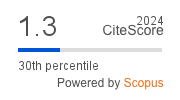The increasing of beta-defensin-2 level in saliva after probiotic Lactobacillus reuteri administration
Downloads
Background: Commesal bacteria is an excellent inducer for beta defensin-2 (BD-2). Probiotics bacteria Lactobacillus reuteri (L. reuteri) as commensal bacteria may play the same role as an excellent inducer for BD-2. Beta defensin is natural antimicrobial peptides widely expressed in oral cavity, including in epithelium salivary gland. Streptococcus mutans (S. mutans) as the main of bacteria causing caries are sensitive to BD-2. Purpose: This research was aimed to determine whether administration of probiotic L. reuteri can increase salivary BD-2 level in Wistar rats. Methods: This research can be considered as a laboratory experimental research with a randomized control group post test only design. Twenty-four male Rattus norvegicus Wistar strain rats aged 3 months were used. They were randomly divided into four groups, namely two control groups (negative control group that was not induced and positive control group induced with S. mutans), and two treatment groups (K1: induced with L. reuteri for 14 days and S. mutans for 7 days, and K2: induced with L. reuteri and S. mutans simultaneously for 14 days). L. reuteri culture at a concentration of 108 CFU/ml and S. mutans culture at a concentration of 1010CFU/ml were induced into the oral cavity of Wistar rats. An examination of BD-2 level was then conducted by using Elisa techniques. results: There was significant difference of salivary BD-2 level among those treatment groups (p=0.001). BD-2 level in saliva was increased after the administration of L. reuteri. Conclusion: L. reuteri probiotic can increase salivary BD-2 level in Wistar rats.
Downloads
- Every manuscript submitted to must observe the policy and terms set by the Dental Journal (Majalah Kedokteran Gigi).
- Publication rights to manuscript content published by the Dental Journal (Majalah Kedokteran Gigi) is owned by the journal with the consent and approval of the author(s) concerned.
- Full texts of electronically published manuscripts can be accessed free of charge and used according to the license shown below.
- The Dental Journal (Majalah Kedokteran Gigi) is licensed under a Creative Commons Attribution-ShareAlike 4.0 International License

















